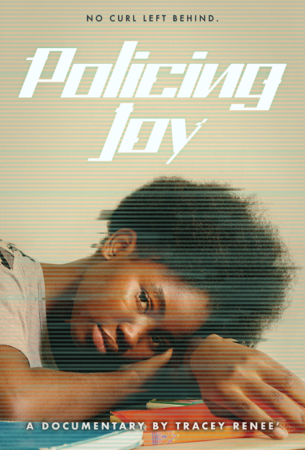Policing Joy is a 21-minute documentary of conversations with Black girls and women. Psychologists, scholars and activists were all interviewed for Policing Joy. They discussed the perpetuation of natural hair bias in the school system. It highlights the emotional impact it has on Black girls, and solutions to move forward in better protecting Black girls and women. Policing Joy was also completed with the aid of the Facebook SEEN and Blackhouse grant.
Since growing up in Shreveport, Louisiana, Howard alumna Tracey Renee’ [Davis] was always keen on the errors of society. This was even if she didn’t have the words to describe the wrongs. That intelligence, along with the drive that she had for advocacy would impact the films she created in her adulthood.
“I’ve always been vocal when it comes to political injustices, especially against Black women, like since elementary. I remember marching into my principal’s room if I felt like my friends were not being treated right, like I’ve always had a fight inside of me,” she recalled.
This film comes at a time where over a dozen states have passed the Creating a Respectful and Open World for Natural Hair [CROWN] Act. The act outlaws hair discrimination or denial of educational and professional opportunities based on hair. Furthermore, 2021 study by Dove found that 100% of Black elementary school girls in majority-white schools said they experience hair discrimination before they’re 10 years old.
The topic of hair discrimination is something Tracey Renee knows all too well.
She has seen it personally and from working in the school system–first as a substitute teacher in Washington, D.C., to now teaching general studies to middle schoolers in Los Angeles.
“At a young age, we’re taught that straight hair is better. So I noticed that when girls wear their natural hair, it’s more of a conversation than when girls wear their straight hair. Sometimes it could be just kids making fun and teacher not really saying anything about it. Even though some people don’t see that as major, it’s major for that student that’s not being supported.” Tracey Renee explained.

She has been both a witness and recipient of hair discrimintation.
The first time she felt her beauty and Blackness was affirmed was attending Howard University. While attending the Washington, D.C.-based HBCU, the filmmaker and educator proclaimed that she felt encouraged by the confidence and ambition of her peers and molded by what professors pour into students. She leaned on her Howard network to produce this film, collaborating with fellow Howard alumni, including cinematographer and editor Rachel Jones, to produce this film.
“Tracey’s like a sister, sometimes little sister, sometimes older sister,” Jones said “I think Tracey can really write, and that’s what attracted me to her filmmaking. Also, too, if I’m not doing anything, if I have time to lend, whatever, I’m there.”
Jones said she used a Blackmagic 6k camera to shoot.
“We didn’t have much, but we utilized what we had–I thought–to the best of our abilities…just pretty much used Howard buddies, and that was it,” Jones said.
The teams consisted of majority Black women with five Black women subject-matter experts featured in the documentary and Tracey Renee’s co-writer, executive producer and sorority sister, scholar Danielle Apugo.
“It’s important to have Black women scholars and artists and creatives in your network because they get you. They have been where you’ve been. They understand what you’re going through, and nine times out of 10, they got the blueprint,” Tracey Renee said.
With a great team, Tracey Renee’s personal hustle and funding and mentorship from Blackhouse and Facebook, Policing Joy was created within just three months. Now, the 21-minute documentary is being screened at film festivals, having been selected to screen at the Richmond International Film Festival and the fifth annual LA Black Film Fest.
Darreonna Davis is a journalism student at Howard University who is working as a Blavity U student ambassador. Davis relies on her news writing, feature writing, production and editing skills to amplify the stories and experiences of Black women.
